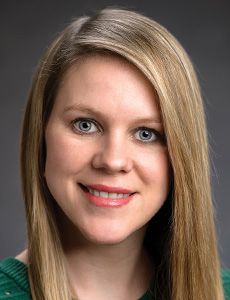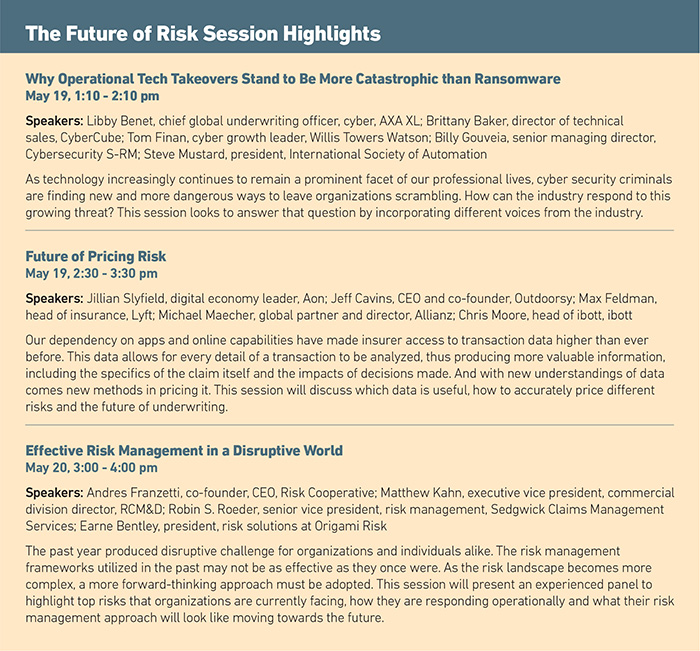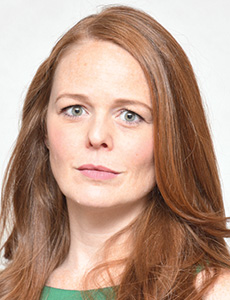The Future of Risk Conference: Everything You Need to Know to Get the Most Out of This Virtual Event

The events of the last year have provided many lessons, inside and outside the insurance industry. One concept is a certainty: It’s vital that we are prepared for what the future brings.
Some risks are difficult to predict or genuinely prepare for — like a global pandemic. Others, like the quick and encompassing incorporation of technology in the workplace, produced abrupt change in the industry.
Insurers can never stay stagnant with their plans. They have to commit to a constant cycle of crafting and recrafting strategy. This conversation on where the industry is headed and how to best navigate a world of risk is the core mission of The Institutes’ The Future of Risk Conference.
The three-day virtual event, running from May 18 to 20 of this year, plans to bring a wide variety of panelists and attendees together to discuss and prepare for what lies ahead.
The Future of Risk has a theme for the conference every year, with this year’s being “Disruption. Innovation. Technology.” Each session will fall under one of these categories and range from topics like the future of pricing risk to discussions on regulating insurance with a former regulator.
The Institutes believes in the power of knowledge and strives to productively distribute it to insurance industry professionals.
The Future of Risk Conference, it is hoped, will further that mission.
Everything to Know About The Institutes’ Future of Risk Conference
The Institutes is home to several brands, including this magazine, with some producing individual conferences of their own every year. But The Institutes wanted to create its own flagship conference, thus creating The Future of Risk, which as the name implies, investigates the future of risk and the risk management profession.
This year, conference coordinators hope to incorporate several of The Institutes’ affiliated brands, thus offering a diverse viewpoint on where the industry is heading.

Kate Horowitz, executive vice president and head of business units, The Institutes
Kate Horowitz, executive vice president and head of business units for The Institutes, said the incorporation of several brands is to better serve the different audiences that The Institutes caters to.
“We asked ourselves, with all the audiences and markets that The Institutes serves, whether it’s senior executives, mid-level professionals or entry-level positions, how can we create a conference that would meet everyone’s needs?”
The question resulted in several panels and sessions, bringing the respective brands’ best thought leaders to navigate discussions on not only the future of the industry but also on how to respond to it.
Additionally, the conference will cater to a broader audience range — a component of the conference The Institutes is extremely excited about.
“It’s really the idea that all of our customers have access for free to any of the conversations that they want to be a part of,” Horowitz said. “The Future of Risk allows individuals the opportunity to cherry pick the sessions they are interested in, while showcasing all of the brands we have and the best that they have to offer.”
The ability for attendees to choose which conversations they want to be a part of has been made easier due to the conference’s all-virtual platform this year. Rather than let the impact of the pandemic force a less-than stellar event, The Institutes has used the very nature of a remote meeting to its advantage.
But why is it important to be so heavily focused on the future of insurance and risk management?
One reason Horowitz mentioned is the speed of innovation the industry has faced in recent years.
“At The Institutes, we think the industry is moving so fast, especially with technology innovations,” she said. “And now more than ever, we think that people need to plan for the future. Because the future is right now.”
Diving Into the Sessions: Facing New Risks and Adjusting Old Practices
It’s no secret that technology has provided both opportunity and added risk to the industry.
As technology continues to evolve, we must be willing and able to keep up with it.

That’s exactly what this The Future of Risk session, “Why Operational Tech Takeovers Stand to Be More Catastrophic Than Ransomware,” plans to delve into.
The session will stress the importance in taking these new technological risks seriously. Many of these risks are new and because of this have not been evaluated in a thoughtful way. Not only do they need to be recognized, but they need to be managed.
The session will consist of a panel of cyber security engineers, with specialties in fields like operational technology, cyber risk consulting, risk modeling and broking. The panel’s discussion will center around not only established areas where improvements could be made but also potential new areas for education and risk management.
Rethinking current strategies, and possibly creating new risk management roadmaps is a central theme of the conference in its entirety.
Strategy also plays a prominent role in Andres Franzetti’s session, “Effective Risk Management in a Disruptive World.”

Jillian Slyfield, managing director and digital economy practice leader, Aon
As new risks gain traction, the entire risk landscape shifts. Successful methods of assessing and mitigating risks used in the past may not be as effective, thus leaving professionals potentially unarmed when an unsuspecting risk presents itself.
Franzetti, chief executive officer of the Risk Cooperative, discussed why his session introduces a necessary conversation.
“Existing risk management frameworks are not necessarily designed for this type of forward-looking analysis, having largely relied on historical performance to determine risk exposures,” he said.
His session will bring insurance, corporate and technology experts together to converse on top emerging risks and their impacts.
Franzetti hopes the session he is moderating will introduce a new approach to insurance and risk management, from the actual risks themselves to organization response.
The rethinking of approaches means a probable change in static industry operations, such as pricing. Aon managing director and digital economy practice leader, Jillian Slyfield, aims to address this in her session titled, “The Future of Pricing Insurance.”
“[The industry] has been pricing insurance the same way for a very long time,” Slyfield said.
“And now, we have new data and we have the opportunity to think differently about risk and how we price it.”
Slyfield credits this need to change pricing approaches to the increased use of technology in every facet of the industry, including transactions.
“As underwriters, we need to start thinking differently around what kind of data we can capture that creates insights around the liability associated with any point of the transaction,” she said.
All three presenters expressed their deep excitement to facilitate these necessary and thought-provoking conversations.
More importantly, they’re all eager to simply begin the conversation on the future of insurance and risk management.
Because, as Horowitz said, the future is right now. &










